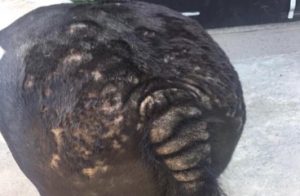Sweet Itch
As we head out of Winter many of our clients across Dorset and The New Forest need to starting thinking about Sweet Itch prevention.
Sweet Itch is a hypersensitivity reaction to biting midges’ saliva. It can affect any horse or pony, regardless of breed although some native breeds are more predisposed to it. This could suggest that there may be some genetic predisposition, Horses as young as 3 years old can show signs of Sweet Itch but the condition can also occur for the first time in older horses. As with all hypersensitivities, it tends to get worse over time as horses become more sensitised the more, they are exposed to the bites.
Sweet itch signs occur when the midges become active and bite. With the ever-changing weather on the South Coast, midges can be active from as early as late February, however, they tend to become more active as the weather gets warmer making the Sweet Itch more prevalent in the summer.
Catching Sweet Itch early increases your chances of being able to manage it effectively through the warmer seasons. Owners whose horses have previously been diagnosed with Sweet Itch will already be starting to use preventative measures to avoid their horses being bitten by midges and restarting the hypersensitivity reaction. If you are unfamiliar with Sweet Itch we have listed the symptoms to keep an eye out for below:
Sweet Itch Symptoms
- Focused itching: especially around neck, mane and tail. Although, this is not exclusive and you may find your horse rubbing and biting wherever they can reach.
- The affected areas may be lumpy, scaly, red or hot to the touch.
- Excessive scratching may result in hair loss, bleeding or thickening of the skin.
- Some horses become restless due to discomfort and can lose weight as a result

If you suspect your horse may be suffering from sweet itch do not delay in phoning us for advice. It is an extremely uncomfortable condition that can be managed well if caught early enough.
Diagnosis
We will examine your horse thoroughly. We may take samples to test for parasites or pathogens. We may offer you specialist allergy testing either by blood or intradermal testing. We may suggest diet allergy trials.
Diagnosing allergy is complex and can require multiple different tests in some cases. In other cases, the clinical signs and environment are highly suggestive of a particular allergy and we may offer trial treatment initially.
Treatment and Prevention
As with many chronic conditions, prevention is generally more effective than treatment.
The key for prevention is avoiding horses being bitten by midges. If you could avoid all midges biting there would be no Sweet Itch. There are many fly rugs that are available now, there have been a lot of developments in this market and they are far more successful than they used to be. You may find your horse or pony needs to be rugged 24/7 throughout the spring and summer, so it is worth investing in a good quality rug that fits your horse well.
Insect repellents. There are a plethora of products on the market now and often it requires trial and error to work out what product suits your horse, your environment and your routine. What works for one horse may not work for another. Not only can you get sprays and creams, there are also bands and tags available now that give a degree of protection for prolonged periods. Good insect repellents regularly applied over the whole body are an essential part of managing this condition. Be careful to read the contents of any sprays, there are a number of veterinary products available so please do contact us for further advice.
There are many treatments available including steroids, anti-inflammatories, anti-histamines, creams, dietary supplements and off license vaccines.
There is lots of research going on into developing a Sweet Itch vaccine (immunotherapy), however it is still a way off being licenced. There is no perfect treatment for Sweet Itch. Each horse needs to be carefully examined and a bespoke treatment plan put together between the owner and the vet. Until an effective immunotherapy/vaccine is produced, all the treatments are treating the symptoms caused by the disease, not the disease itself.
Sadly, Sweet Itch is a lifelong condition that needs to be managed. Drugs are only a small part of the management. Owners should be prepared to monitor their horses closely and adapt their management significantly to control this disease.
